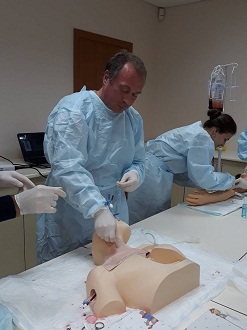The importance of adhering to the main stages of the venous access and avoiding typical technical errors in its implementation was emphasized. Before the start of the simulation session, instructions were given about the rules of behavior at the Center. For the mastering and improvement of technical skills, constant practice and simulation are needed, it allows to bring the technique of performing these techniques to automatism. This was stated by the head of the department of anesthesiology and intensive care, professor Oleh Anatoliyovych Loskutov. During the classes were used static simulation tools, developed for mastering specific manipulations of puncture-catheterization of the subclavian and internal jugular veins and also the peripheral vein. Practical classes in groups have already been held by professor Loskutov OA, associate professor Markov YuI and graduate student Kolesnikov VH. According to the teachers of the Department of Anesthesiology and Intensive Care of the Academy, such classes, in addition to mastering practical skills, help to solve the important task of accelerating the adaptation of interns to work in the operating room, since work in rubber gloves, masks, and medical clothes and shoes. At the end of the session, a 30-minute debriefing was held with a discussion of the main errors and shortcomings in the performance of the central and peripheral venous access. In the opinion of interns, the use of simulation tools in the modernly equipped Center for Simulation Training Methods of NMAPE is an excellent solution to the problem of developing catheterization skills for central veins.
Beginning of activities in the center of simulation methods of education for resident doctors of the department of anesthesiology and intensive care
- Details




